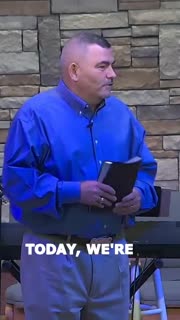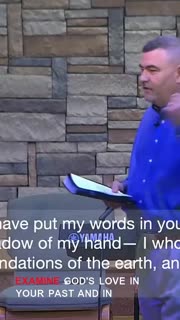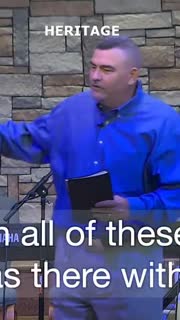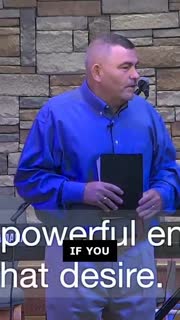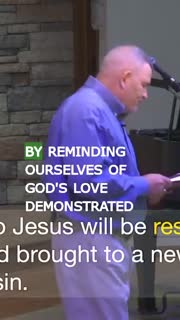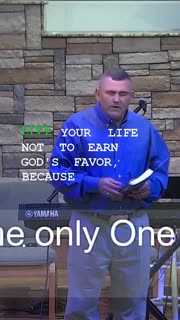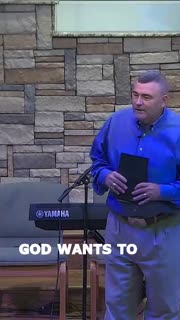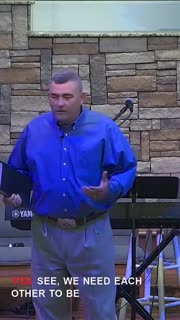Faith: A Personal Journey Through Generations
Devotional
Sermon Summary
Bible Study Guide
Sermon Clips
1. "Today, we're going to talk about coming to a place where our faith becomes our own. You know, my grandparents had great faith. My parents have great faith. I grew up learning about God. But there had to come a point where that faith went beyond my parents and my grandparents that it became my faith. And in order for us to get to that point where the faith of others that have poured into us and taught us and trained us so much, there comes a point where we have to take that step." [32:37] (47 seconds)
2. "Examine God's love in your past and in the past. When God chose the people of Israel, out of all the people of the world, God chose this one people to be His chosen people. But when He chose the nation of Israel, Israel was one man, and one woman. A man named Abraham, or Abram, and his wife, Sarah. That was it. That was the family. That was the nation of Israel. That is all. One man. But God saw something in Abraham that He wanted to draw out." [37:02] (51 seconds)
3. "If you don't have that heritage of faith, then make the commitment that your grandchildren will say, look at what God has done. Look at who God is. God is powerful enough to honor that desire. If you have that desire to build that heritage of faith, know that God is powerful enough to honor it. just saying, I'm going to commit to doing it, that is not enough. You've got to practice it. You've got to live it out." [44:33] (34 seconds)
4. "If you want your grandchildren to know and love Jesus, then you've got to start putting in the work right now. You may go, some of you young ones are going, but Grant, I don't have, I don't even think I know I've met who I'm going to marry. Great. Start putting in the work now so that when you meet that person that God is going to have you to marry, that you are ready, to build on a heritage of faith. Build on it." [46:01] (27 seconds)
5. "By reminding ourselves of God's love demonstrated in the past, of God's love promised in the future, we can also examine His love in the present. In these verses 9 through 11, God calls on His people to awake. He says to them, wake up. He's calling them out of spiritual sleep. He says, have your eyes open. What's He saying, have your eyes open to? He says, have your eyes open to what I am doing, what I'm doing around you, in you, through you, and among you." [50:41] (36 seconds)
6. "Live your life not to earn God's favor, because you cannot do it, but live your life as a way of saying, thank you to God for His favor. Thank you to God for His mercy. Thank you to God for His salvation. I challenge you, look at God's past. Not just the ancient past, but the past in your life. Look at God's future for you. Look at how God is working in your life right now. And then ask yourself, why do we live so lukewarm?" [53:30] (45 seconds)
7. "God wants to change your life. But the only way that happens is if we first admit that we are sinners. We admit our failings. My grannies, great people, but they weren't perfect. They sinned. And the only way that I will get to see them again is not because they were such great people. I will get to see them again because they knew Jesus Christ as their Lord and Savior." [56:14] (37 seconds)
8. "You see, we need each other to be accountable. We need each other to encourage us. We need each other to pick us up when we struggle. We need each other when life has beat us up. We need each other to be there as that support base. And that's why we have a church. That's why we have our church family to come together to worship, to grow together, to build those relationships and those bonds that when hard times come, we know who we can count on." [57:07] (38 seconds)
Ask a question about this sermon
2. "Examine God's love in your past and in the past. When God chose the people of Israel, out of all the people of the world, God chose this one people to be His chosen people. But when He chose the nation of Israel, Israel was one man, and one woman. A man named Abraham, or Abram, and his wife, Sarah. That was it. That was the family. That was the nation of Israel. That is all. One man. But God saw something in Abraham that He wanted to draw out." [37:02] (51 seconds)
3. "If you don't have that heritage of faith, then make the commitment that your grandchildren will say, look at what God has done. Look at who God is. God is powerful enough to honor that desire. If you have that desire to build that heritage of faith, know that God is powerful enough to honor it. just saying, I'm going to commit to doing it, that is not enough. You've got to practice it. You've got to live it out." [44:33] (34 seconds)
4. "If you want your grandchildren to know and love Jesus, then you've got to start putting in the work right now. You may go, some of you young ones are going, but Grant, I don't have, I don't even think I know I've met who I'm going to marry. Great. Start putting in the work now so that when you meet that person that God is going to have you to marry, that you are ready, to build on a heritage of faith. Build on it." [46:01] (27 seconds)
5. "By reminding ourselves of God's love demonstrated in the past, of God's love promised in the future, we can also examine His love in the present. In these verses 9 through 11, God calls on His people to awake. He says to them, wake up. He's calling them out of spiritual sleep. He says, have your eyes open. What's He saying, have your eyes open to? He says, have your eyes open to what I am doing, what I'm doing around you, in you, through you, and among you." [50:41] (36 seconds)
6. "Live your life not to earn God's favor, because you cannot do it, but live your life as a way of saying, thank you to God for His favor. Thank you to God for His mercy. Thank you to God for His salvation. I challenge you, look at God's past. Not just the ancient past, but the past in your life. Look at God's future for you. Look at how God is working in your life right now. And then ask yourself, why do we live so lukewarm?" [53:30] (45 seconds)
7. "God wants to change your life. But the only way that happens is if we first admit that we are sinners. We admit our failings. My grannies, great people, but they weren't perfect. They sinned. And the only way that I will get to see them again is not because they were such great people. I will get to see them again because they knew Jesus Christ as their Lord and Savior." [56:14] (37 seconds)
8. "You see, we need each other to be accountable. We need each other to encourage us. We need each other to pick us up when we struggle. We need each other when life has beat us up. We need each other to be there as that support base. And that's why we have a church. That's why we have our church family to come together to worship, to grow together, to build those relationships and those bonds that when hard times come, we know who we can count on." [57:07] (38 seconds)
